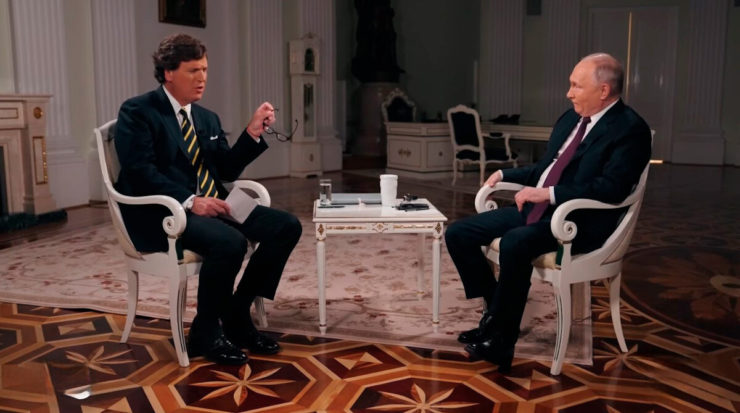
“Putin, Carlson and the American people”, “Interview changing the future of political media”, “Putin and Biden”. These and other media headlines reflect the perception and assessments in the media space of the Middle East of the interview of the President of the Russian Federation V.V. Putin given to the American journalist T. Biden. Putin’s interview with the American journalist T. Carlson. Carlson.
It made the pages of many Arab newspapers and remains a topic of local commentators. A number of authors note that the dialogue between the two in the Kremlin is noteworthy because it opens missing doors for understanding the hot international conflict.
Carlson came to Moscow, realising the ignorance in which the Americans and the people of Europe find themselves because of the artificial eclipse of Moscow’s point of view created by the West. Putin’s answers to him were as intense as possible. For the journalist it was one of the episodes of his career, and for his interlocutor it was a question of Russia’s national security with many red lines, says the Saudi author.
He is, according to the author, not just a politician defending his decisions, but a highly educated intellectual who defends his life’s work, a narrative of history and law. At the same time, they highlight the style of the Russian leader, who backed up his thesis not only with important documents that he had thoroughly read, but also relied on his often confidential conversations he had with a number of American and Western leaders.
Without pressure, freely, in a manner accessible to a wide audience, he addressed the American and European people in an attempt to dispel the atmosphere of hostility towards him and Russia that had been established in America and the West.
The Lebanese Centre for Studies “SITA” agrees with this, calling the conversation with V. Putin a kind of “historical inventory” of information about Ukraine. It was a real break in the network of various restrictions on Moscow’s point of view, especially after its official channels were blocked and shut down in Europe and the United States.
Putin has succeeded in his media war; the Emirati author concludes. It is precisely the fact that he has been able to convey his country’s position to Western public opinion, which has been systematically brainwashed to “demonise” Kremlin, that has caused a storm of anger and concern in the West.
Middle East commentators point out that the Kremlin talk received millions of views in a matter of time, something the world’s most powerful satellite channels often cannot boast of. The intrigue is that it aroused interest in its difference and departure from the traditional mainstream media line monopolised by the West.
But now there is evidence that the political configuration in the media is changing. What was under control has gone out of control. This, according to a Saudi publicist, is happening rather than because there is a conflict within America, or a conflict with Russia. The main reason is that the world is changing at a rapid pace.
The world in front of the new media mechanism will face serious challenges, and the gradual disconnection from the official media will undoubtedly be a future phenomenon that finds support from a popular audience that is far from the politics of the top. It can be argued here that this “historic interview” may be the most serious step that will push the international political space to embrace the idea of playing politics in the open.
The interview with the Kremlin leader has prompted a number of Arab analysts to reflect generally on the topic of the level of contemporary world leadership. A commentary published by the largest Egyptian newspaper, Al-Ahram attracts attention. Its author compares the way of action, thinking style and behaviour of two world leaders: Russian and American.
Putin has subtly and unobtrusively demonstrated, the publicist writes, who is worthy of leading the world. Someone who has lost concentration and continues to make the same mistakes over and over again. Or the one who recognises and grasps what is going on around him, who can make the right decisions at the right time, and who has the qualities of a leader when he speaks. He weighs his words precisely and calculatingly so as not to appear like a lost alien who has just arrived at planet Earth.
After that, concludes the Egyptian author, I leave the final judgement to viewers and readers to determine fairly, and impartially who is more worthy to lead the world: Putin or Biden!?
Yuri ZININ – Senior Researcher, Institute for International Studies (IfIS), especially for the online magazine “New Eastern Outlook“